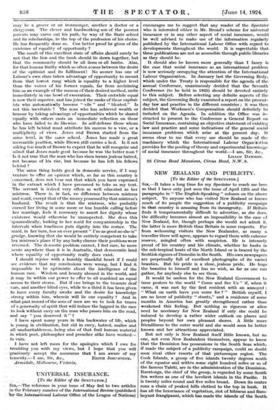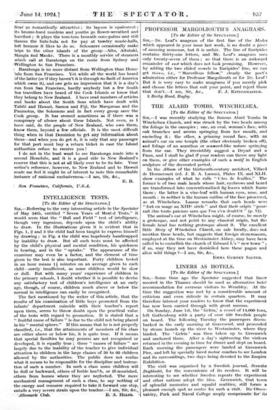NEW ZEALAND AND PUBLICITY. [To the Editor of the SPECTATOR.]
SIR,—It takes a long time for my Spectator to reach me here so that I have only just seen the issue of April 12th and the paragraphs in-" The English-Speaking" column on the above subject. To anyone who has visited New Zealand or knows much of its people the suggestion of a publicity campaign -in that country is amusing from its incongruity. If Britain finds it temperamentally difficult to advertise, as she does,
the difficulty becomes almost an impossibility in the case of New Zealand, for, though perhaps she would not admit it, the latter is more British than Britain in some respects. Far from welcoming visitors the New Zealander, as many a traveller there will agree, appears to regard them with extreme reserve, mingled often with suspicion. He is intensely proud of his country and his climate, whether he basks in the sub-tropical heats of the North Island or is braced by the Scottish rigours of Dunedin lathe South. His own newspapers are perpetually full of excellent photographs of its varied beauties. But his pride is a close, jealous pride. He hugs the beauties to himself and has no wish, as far as one can gather, for anybody else to see them.
It would be useless for the New Zealand Government to
issue posters to the world "Come and See Us" if, when it came, it was met by the first resident with an annoyed : "What on earth have you come for ? " British myself, I am no lover of publicity "stunts," and a residence of some months in America has greatly strengthened rather than weakened this feeling. But nothing so rigorous or alien need be necetsary for New Zealand if only she could be induced to develop a rather wider outlook on places and peoples beyond her own pleasant shores. A little more friendliness to the outer world and she would soon be better known and her attractions appreciated.
But not only is New Zealand itself little known, but no one, not even New Zealanders themselves, appear to know that the Dominion has possessions in the South Seas which, if made the subject of a publicity campaign, could no doubt soon rival other resorts of -that picturesque region. The Cook Islands, a group of five islands twenty degrees south of the equator and within some eight hundred miles or so of the famous Tahiti, are in the administration ofthe Dominion. Rarotonga, the chief of the group, is regarded by some South Sea writers as one of the loveliest islands in the Pacific. It is twenty miles round and five miles broad. Down its centre runs a chain of peaked hills clothed to the top in bush. It has all the luxuriance of vegetation, riot of hibiscus and flam- boyant frangipanni, which has made the islands of the South.
Setta--- so ioniantically attractive'; its lagoon is 'opalescent ; its bronze-hued maidens and youths- go floWer-irreathed and barefoot ; it plays the tom-tom beneath- coeo-palms'and still 'dances the billa-hula not for pay at tawdry music-halls, bift 'because it likes to 'do go. SchoonerS occasionally make trips to -the other islands of the group—Aitu, Aitutaki, Mangia And -Mauke. There is 'a monthly- service of steamers which call at Raratonga on the route from Sydney and Wellington to San Francisco.
Raratonga is no more 'distant from Wellington than Hono- lulu from San Francisco. Yet while all -the world has heard Of the latter (or if they haven't it is through no fault of America -which owns it), and one gets an impression that it is a day's run froth san. Francisco; hardly- anybody but a few South Sea travellers have heard of the Cook Islands or know that they belong to New Zealand. I have read numbers of articles and books about the South Seas which have dealt with Tahiti- and Hawaii, Samoa and Fiji, the Marquesas and the Patunotas, the Solonions and in fact every group save the Cook group. It has seemed sometimes as if there was a conspiracy of silence about these Is/ands. Not even, as I have said, do the people of New Zealand, who own them, know them, beyond- a -few officials. It is the most difficult thing when in that Dominion to get any information about theni—and when you do get it, it is only that any passenger for that port must buy a 'return ticket in ease the Island .authorities refuse to receive ' you !
. I do not in the least want to see Raratonga made into a second Honolulu, and it is a good side to New Zealand's reserve that this is not at all likely ever to be its fate. Your writer's reference, however, to New Zealand and to Hawaii made me feel it might be of interest to note this remarkable AnStance of national exclusiveness.—I am, Sir, &c., E. B. San Francisco, California, U.S.A.











































 Previous page
Previous page